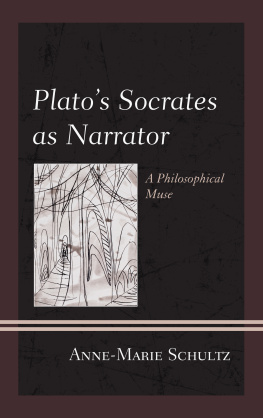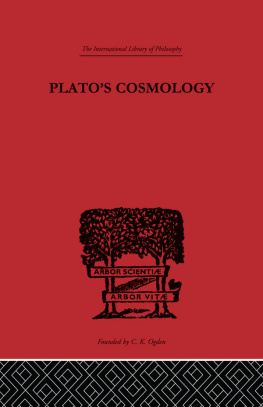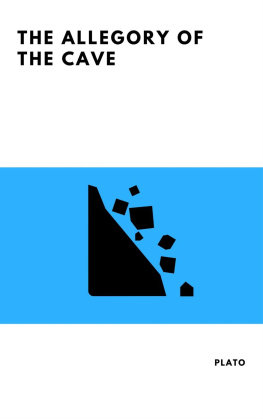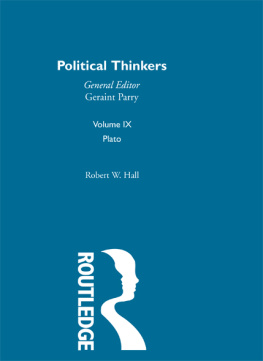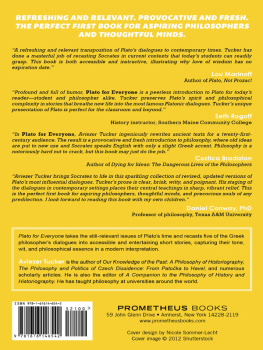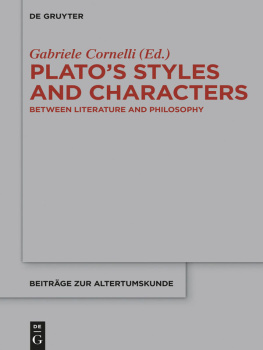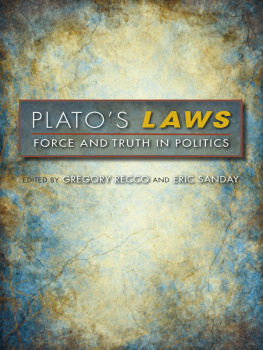THE CRANES WALK
THE CRANES WALK
Plato, Pluralism, and the Inconstancy of Truth

Jeremy Barris

Copyright 2008 Fordham University Press
All rights reserved. No part of this publication may be reproduced, stored in a retrieval system, or transmitted in any form or by any meanselectronic, mechanical, photocopy, recording, or any otherexcept for brief quotations in printed reviews, without the prior permission of the publisher.
Fordham University Press has no responsibility for the persistence or accuracy of URLs for external or third-party internet websites referred to in this publication and does not guarantee that any content on such websites is, or will remain, accurate or appropriate.
Library of Congress Cataloging-in-Publication Data
Barris, Jeremy.
The cranes walk: Plato, pluralism, and the inconsistency of truth / Jeremy Barris.
p. cm.
Includes bibliographical references and index.
ISBN 978-0-8232-2913-0 (cloth : alk. paper)
1. Truth. 2. Certainty. 3. Pluralism. 4. Plato. I. Title.
BD171.B26 2008
121dc22
2008037467
Printed in the United States of America
10 09 08 5 4 3 2 1
First edition
To my mother, Isabel Barris, and my late father, David Barris, who taught me to see and hold to the important things, and whose lessons and qualities continue to deepen and grow in me.
To Roy Blumenthal, Stephen de Wijze, and James Mills, for more than words can say.
Preface
This is a book about establishing truth by a type of risk-taking, and the relation of that process to the nature of truth, to being ones self, and to living responsibly in a pluralistic society. I say establishing truth and not knowledge, since I discuss truth not only as a property of knowledge but also as the structure of reality.
As one central theme, I try to show that we can conceive and live with a pluralism of standpoints with conflicting standards for truth, while the truth of each is at the same time entirely unaffected by the truth of the others. That is, I shall try to show that one kind of contradiction is perfectly in order: that we can, and must, conceive the same truth as in some contexts simply absolute and in others relative. I discuss the relations and transitions between these contexts in detail.
I try to show that Platos dialogues express the views I present here. I first develop an account of the nature of truth through which to interpret his work, with only provisional reference to his dialogues. Once that is done, I investigate the dialogues in a continuous way. I believe that the framework I develop is necessary to understanding Plato, but I hope that it is also true and worthwhile in its own right, irrespective of whether it is accurate as an interpretation of his work.
Truth, as I understand it here and as I argue Plato also understood it, is often in conflict with itself. As a result, it often requires one to straddle incompatible sides of the fence and even wholly different types of terrain on each side of the fence: hence, I argue, the importance of Platos sense of humor, and of the cranes walk in my title. When a crane walks, it moves simultaneously and apparently independently in two dimensions, vertical and horizontal. A crane can also stand equally well on one leg (or ground) or two.
This book, then, explores the nature and importance for truth and for our lives of what might be called a delicately poised ungainliness, or a perfect, ungainly poised elegance.
Acknowledgments
I would like to thank Greg Galford and Andrea Walter for many years of loving and open-eyed encouragement.
This book is presented with financial assistance from the West Virginia Humanities Council, a state program of the National Endowment for the Humanities.

THE CRANES WALK
INTRODUCTION
Understandings of Plato and a Feature
of Truth-Seeking Thought
To try to understand the nature of truth might seem a very arrogant undertakingand in an important sense, it is. But while not all of us try to understand the nature of truth, we all live as though we have already succeeded in understanding it. We all have ideas of how truth works, and we all act on those ideas, often in active opposition to conflicting ideas of truth. It is perhaps less arrogant, then, and less irresponsible to try to understand the nature of truth and so open our understanding to criticism and correction by ourselves and othersrather than to act firmly on the basis of an understanding we also claim no one should even try to gain. As Platos dialogues show, he himself was very much aware of these alternatives.
Plato carefully explored the nature of what he saw as truth and its importance for life. I try to show that whatever we may think of the particular truths he saw, nevertheless just his concern for truth, and the careful way that he showed to explore the nature of truth and its importance for life, carry over helpfully to the exploration of our own ideas of truth and its importance. And, as I argue in this book, the exploration of the nature of truth is itself part of the nature of truth. To try to understand Platos specific exploration of truth is therefore also already to try to understand the nature of truth and its importance for life. This book, then, even in the respects in which it deals specifically with Plato, is most importantly about the nature of truth, including the dimension of it that is the truth of individual and social life.
As one central theme, I try to show that there is a certain contradiction in the nature of truth, and that this is perfectly in order: that we can conceive and live in the context of a plurality of standpoints, each with different standards for truth, while the truth of each is also entirely unaffected by the truth of the others. That is, I try to show that we can, and must, conceive the same truth as simply absolute in some contexts and relative in others. I discuss the relations and transitions between these contexts in detail. As another central theme, I try to show that precisely this coordination of mutually exclusive conceptions of truth allows us to establish truth without the traditional problems of circularity or infinite regress. And in the course of discussing these themes, I try to show that this contradiction in the nature of truth requires us to reunderstand not only the nature of truth but also, as a result, the nature of consistency, and so also of thought.
While I try to show that Platos dialogues express the views I discuss here, I do so by first presenting, in . As I say in the Preface, while I believe that this framework is necessary to understanding Plato, I hope it will justify itself as having value in its own right, irrespective of whether it is accurate as an interpretation of his work. I aim, then, to present a way of thinking that, I argue, solves some contemporary problems, a way of thinking that I also believe Plato already presented.
With that in mind, in this Introduction I present a short history of how Plato has been understood in order to locate my understanding in relation to it.
Plato is often ironic, saying or doing one thing in order to say or do another very different and often directly opposed thing. His irony is usually understood to occur in the context of a nonironic doctrine about, or understanding of, or attitude toward the world and the place of people in it. A more subtle variant of this interpretation is that his nonironic doctrine, understanding, or attitude is presented
Next page


